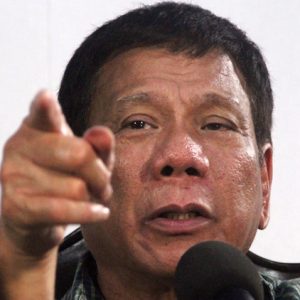Philippine President Rodrigo Duterte faced Al Jazeera‘s Jamela Alindogan and Wayne Hay in an interview conducted the 15th October 2016 in Malacanang palace. The first of two instalments of the video recording of the interview made available on YouTube is shown below.
The key topics raised by Alindogan and Hay revolved mainly around two issues — Duterte’s “war on drugs” and the South China Sea in light of his scheduled visit to China.
Hay’s line of questioning surrounding the “war on drugs”, was underpinned by the assumption that Duterte was the cause of more than 3,000 deaths so far attributed to this war. This is the seminal assumption that started a global media circus. Duterte’s position on the matter is quite simple and he expressed this succinctly during the interview — no law had been broken thus far. While the world chatters about this “bloody” war on drugs and the supposed plight of its “victims”, the fact that the drug menace itself that Duterte is combatting, has far more real victims seems to have been glossed over (some insist deliberately) by mainstream media in favour of the easier conjecture.
Ultimately, it comes down to the error in the perception that Duterte “encouraged” vigilantism. The fact is, Duterte points out, it is the president’s duty to express a hard stand on any threat to his country, and that there is no law in the Philippines barring him from using the harshest words to stress that stand. To Duterte, the destructive power of the drug menace is a real threat to the Philippines’ youth and, therefore, the country’s future. And so, “you destroy my country, I’ll kill you” is Duterte’s straightforward stand on the matter — “nothing wrong in trying to preserve the interests of the next generation,” Duterte adds.

“You destroy my country, I’ll kill you…”
– Philippine President Rodrigo Duterte
– Philippine President Rodrigo Duterte
Interpreting that stand as “encouraging” vigilantism is the evident editorial error in both local and foreign media’s so-called “reporting” of the situation in the Philippines. Indeed, Duterte points out that Media’s penchant to report scores of innocent civilians — including children — killed in the next US air strike in one or another war zone as “collateral damage” highlights the hypocrisy of the way the industry is quick to report casualties in the Philippines’ war on drugs as “murder”.
As for the South China Sea situation, the line of questioning was, again, underpinned with a flawed assumption — that Duterte’s willingness to talk to China is “coming from a weak position”. To that, Duterte’s position is quite simple: nobody in the Philippines — not even the president — can give up the Philippines’ entitlements in the South China Sea. Rather, “you can only negotiate to prevent war” during any talks with China, Duterte points out. In essence, compromising the Philippines’ entitlements in the South China Sea is out of the question — but talking things over with China will always be an option.
It can’t be more plainly and clearly put than this. The drug menace is a threat to the Philippines’ future, so it needs to be dealt with decisively. The Philippines’ entitlements to South China Sea assets are enshrined in its Constitution, so any president can only work within that framework in any talks with China.
It’s simple, really.
http://www.getrealphilippines.com/blog/2016/10/duterte-leaves-al-jazeera-reporters-stumped-elegantly-simple-answers/

No comments:
Post a Comment